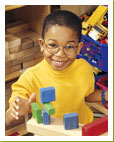| APRIL IS OCCUPATIONAL THERAPY MONTH! | 
| |
Register now, limited spaces available!
|
| Summer Programs |  | |
A few openings left for TLC's Summer Programs!
|
Young Yogis
After School Program |  | |
Yoga is a wonderful way to improve strength, flexibility, confidence and focus - for everyone!
|
| "A Child's View of Sensory Processing Disorder" |
Learn about Sensory Processing Disorder from the perspective of a child.
|
|
|
Welcome to our first issue of Kids Making Strides!
Spring is in the air and we are thrilled to have the opportunity to share news and innovative ideas from our departments. Every day, we have the chance to meet and collaborate with children and their parents and through these interactions, we learn more about their needs and concerns. At TLC, we strive to be a valuable resource for our families and our local community. We hope you will find this information meaningful and we welcome your feedback and questions.
Please join us in celebrating Occupational Therapy Month in April and Better Hearing and Speech Month in May. TLC is offering events for families and professionals. Events for OT month are listed in this issue. Stay tuned for more about BHSM!
Wishing you a happy, healthy Spring!
TLC's Outpatient Occupational Therapy and
Speech-Language Pathology Departments
|
Play With Your Baby: It Just Makes Sense
By Erica Fuentes, MOT, OTR/L
|  As seen in April 2013 Washington Parent Magazine...
It's never too early to play with your newborn. Play is how babies and children learn about the world. Newborn infants (birth to 3 months) don't pretend to bake cookies, play dress up or throw balls around, which we normally think of when talking about play, but they do benefit from other types of "play."
Sensory Exploration
Opportunities for play with your infant are all about sensory exploration: what a baby feels, sees and hears and how a baby moves. The benefits of this type of sensory play allow parents and babies to learn about each other, develop warm interactions that strengthen bonds and help create intimate moments that nurture the beginning of a loving relationship. By encouraging play, you can help achieve developmental milestones and also lay the foundation for more advanced motor, language, social, emotional and cognitive development.
|
|
Keeping Mealtimes Positive for Your Family
By Debra Piccirillo, M.S., CCC-SLP/L
Director, Speech-Language Pathology
|
 Mealtimes can be a wonderful, enjoyable time to socialize and connect with your children. At every meal, your child learns about exploring new tastes and textures of food, as well as family traditions and culture. We form memories each time we sit down to a meal. However for some, mealtimes can become a challenge. If you and your child are fighting about food, or your child does not like eating and does not appear to feel good about their mealtime, consider the following suggestions to promote more pleasant mealtimes. Mealtimes can be a wonderful, enjoyable time to socialize and connect with your children. At every meal, your child learns about exploring new tastes and textures of food, as well as family traditions and culture. We form memories each time we sit down to a meal. However for some, mealtimes can become a challenge. If you and your child are fighting about food, or your child does not like eating and does not appear to feel good about their mealtime, consider the following suggestions to promote more pleasant mealtimes. As parents we decide what we are going to feed our children, when we are going to feed our child and where the meal will take place. Our children decide how much they are going to eat and how social they are going to be at a mealtime. A mealtime is built on trust between a parent and child. When a breakdown occurs in that trust there are some ways to build it back. |
|
Making Sense of Sensory Strategies for
Our Children
by Brigid Baker, OTR/L, Director of TLC's Occupational Therapy Service
| 
Recently, there has been a lot of 'buzz' around the term "SENSORY" ... "sensory processing", "sensory friendly performances" and "sensory seeking behaviors." Even though these terms may be common in today's lingo, they may be misunderstood. But they don't have to be.
Sensory Processing (also known as Sensory Integration) is the ability to take in information from our environment through our senses and process that information to make a response. We are constantly bombarded by input from our environments through our sense of touch, smell, taste, hearing and vision as well as the sense of knowing where our bodies are in space and how to grade the speed and force of our movements. For most of us, this ability to process sensory stimuli is automatic and we are able to receive sensory messages and organize them efficiently into motor responses without even thinking about it. However, some children (and some adults) may have difficulty processing and using this sensory input, which can negatively impact their ability to interact and engage with the world around them.
Link to Making Sense of Sensory Strategies for our Children factsheet.
|
Tips for Expanding Your Child's Language through Daily Routines
By Stacey Thompson, M.A., CCC-SLP
Lead Speech-Language Pathologist
|
 Let's face it, life is busy. Parents of children with speech and language difficulties often wonder how to help their child when it seems that they cannot fit one more thing into their schedules. Believe it or not, there are easy ways to incorporate language into every day activities without breaking the routine or overwhelming the entire family. Let's face it, life is busy. Parents of children with speech and language difficulties often wonder how to help their child when it seems that they cannot fit one more thing into their schedules. Believe it or not, there are easy ways to incorporate language into every day activities without breaking the routine or overwhelming the entire family.
MORNING:
- While waking your child in the morning, talk to him about what to expect during his day. Use the words first, second, then, and last. Have him guess what will happen before or after a certain event.
- While getting dressed, give your child choices about what he can wear. Use descriptive words such as, "Do you want to wear your bright red shirt with a green dinosaur or your dark, blue, long sleeve shirt with a fish?"
- When eating breakfast, do silly things. For example, give your child a bowl for his juice instead of a cup, or a fork instead of a spoon to eat his cereal. Wait for him to comment before bringing his attention to it. Give him an empty cup and plate in order to
encourage him to ask for his drink or food.
|
|
|
Thank you for reading Kids Making Strides! Please feel free to share your feedback or suggestions with us. As always, we are available for your questions and comments.
Sincerely,
Brigid Baker
Director of TLC's Occupational Therapy Services
Debra Piccirillo
Director of TLC's Speech-Language Services |
|
|